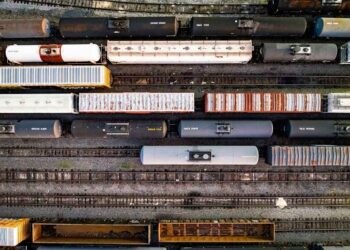Maggie Simpson , ED of RFG, welcomed delegates to the RFG’s Spring meeting which held at the NEC in Birmingham during the Multimodal 2016 exhibition and conference.
The theme of the event was ‘Transforming rail freight through technology’, and she outlined how, given the changing face of the market for rail freight, a greater reliance on innovation and development would be necessary to meet customer needs. The speakers had therefore been asked to consider how technology could help progress and growth in a range of areas.
The first speaker was Andrew Bowen, Project Engineering Director, DP World London Gateway, who explained how automation at the port had provided a real leap forward, especially as the size of container ships continues to get larger.
“When you need to get 8,000 containers on and off in 36/48 hours, you need to improve productivity and reliability – and technology is key to that. We have automated stacking cranes, semi-automated RMGCs, and the next four quay cranes will see the drivers sit in a building and drive off cameras.â€
Trains arrive through a rail-dedicated OCR portal as they enter the port and the information is used to help improve the efficiency of unloading the containers and it also gives real-time status to customers. However, the interface of port and railway systems means that the rail terminal is less automated than the equivalent quay side facilities, and more work is needed to progress this area.
Steve Pryce, DB Cargo Head of Quality Management, emphasized that rail needs to get smarter as cities get greener and the road industry continues to innovate with, for instance, autonomous driving, platooning and continuing emissions efficiencies. “We need to reinvent ourselves to find new markets as traditional ones decline – and technology can help us do that.â€
“We need to embrace digitalisation so we have, for instance, predictive maintenance for locos and wagons, and we need more visibility on utilisation. We need integrated planning tools to replace Exel spreadsheets and customer-facing IT so they can interact with our systems.â€
Paul Turner, Technical Director, Revolve Technologies looked at the question: ’what is the future of big diesel technology for locomotives?’ He explained that using hydrogen as an alternative energy would “reduce emissions while matching your power needsâ€.
It is widely produced as a by-product in industrial processed, is much safer than people think and can be retro-fitted on the current loco fleet. He did admit however that it would need a hydrogen storage carriage to be pulled and that the fuel logistics operation could be a challenge. It was clearly an area for future research, if wholescale electrification of the UK network stalls.
David Young, Network Rail’s CACI project sponsor, said Network Rail is aiming to improve services to customers by instigating projects that will lead to: more efficiency, reduce operating costs, greater visibility across the supply chain, increase network performance and capacity, and lower barriers to entry.
Mobile Timetable Information Service (MTISA) was already live, with mobile consisting (MCA) being rolled out and Freight Collaborative Decision Making (F-CDM) going through workshops at the moment. David also said: “We recognize that one thing we don’t do particularly well is share information with end users.â€
David noted that Network Rail is now looking for customer engagements in these systems to progress to full implementation and roll out.
Richard Wilby, Managing Consultant at Scott Lister, looked at how the railway industry can learn from aerospace, another heavily regulated industry, in terms of building cost-effective scheduled maintenance programmes. Both need to sustain the ‘as designed’ level of safety and reliability through the life – and do it at a reasonable cost. He emphasised the value of talking to “the guys who get their hands on the product†as they know more than the designers when it comes to maintenance issues.
Mark Shepherd, Operations Manager at RVEL, explained that his company is the latest to gain an operating licence – which has been an aspiration since Loram took a 51% interest in RVEL last year. “This now allows us to offer a collection and delivery service to customers as well as our maintenance and bespoke train engineering services.â€
He said anyone else seeking to obtain a licence should ensure that they got the right people to help so that the application is closely aligned to the assessment criteria, and that they had worked closely with the ORR as well.
































